Opting for the quietest central air conditioner you can find will make a noticeable difference to overall noise levels. Of course, you must ensure you balance noise against efficiency and cooling power.
That’s where this guide comes in. Below, I’ll review my top picks for the quietest central air conditioners. First, though, let’s look at what we mean by quiet so we know what to look for.
How Quiet is a Central Air Conditioner?
A quiet central air conditioner can have a noise level of 50dB. A normal AC unit can be in the 70s or 80s, which is 4 times as loud in terms of perceived noise level.
In terms of “real world” sounds, 50dB is roughly the same as moderate rainfall. City traffic is roughly 70dB (if you were walking along the street next to it), as is a vacuum cleaner, and 80dB is about the same as your garbage disposal.
Remember, decibel ratings fall on a logarithmic scale. It means that an increase of 10dB results in a doubling of the perceived loudness of a sound. So, a noise range of 20dB might not sound a lot, but it’s a difference of 400%.
55dB certainly isn’t too loud for an AC. You’ll find smaller or portable models are quieter, mainly because they’re not as powerful. But a quiet AC can be around 55dB, which is fairly quiet.
Importantly, most manufacturers (should) include a decibel rating in their product specifications. Although not everyone always pays attention to noise levels, it’s usually something noted when buying air conditioners. They’re a product most people see as loud, and having noise levels has become common as a result.
What Causes Noise in an Air Conditioner?
There are plenty of noise sources in a central AC system. Below are the main culprits, followed by a short section on features that’ll help you combat these noises.
Fans
An air conditioner has fans in the outdoor and indoor units. Even brand new fans will make some noise, but older fans can whirr and clunk if they’re not maintained properly.
There’s not much you can do to completely soundproof an AC’s fans. However, noise reducing fan blades are becoming increasingly common to deal with this issue.
Compressor
An AC compressor does most of the work. It’s where the refrigerant is compressed from a gas into a liquid, hence the name. You’ll find the compressor in the outdoor unit.
It’s got plenty of moving parts that make noise. But noises like banging and grinding indicate problems with the compressor, such as with the pistons. If you hear these, you should get your compressor inspected.
Duct System
The ducting in an air conditioner doesn’t make noise itself, but it’s amazing at transporting sound. After all, it’ll have plenty of surfaces off which sound waves can reflect, basically making it an echo chamber.
As such, any noises made by the outside unit might appear much louder by the time they reach your room. You can avoid this by having a quiet air conditioner, of course, but also by using flexible ducting and insulation.
Thermostat
Finally, there’s the thermostat. It makes a clicking noise as it turns on and off. Again, there’s not much you can do about this, but compared to the sounds made by the compressor, it’s really not much to worry about.
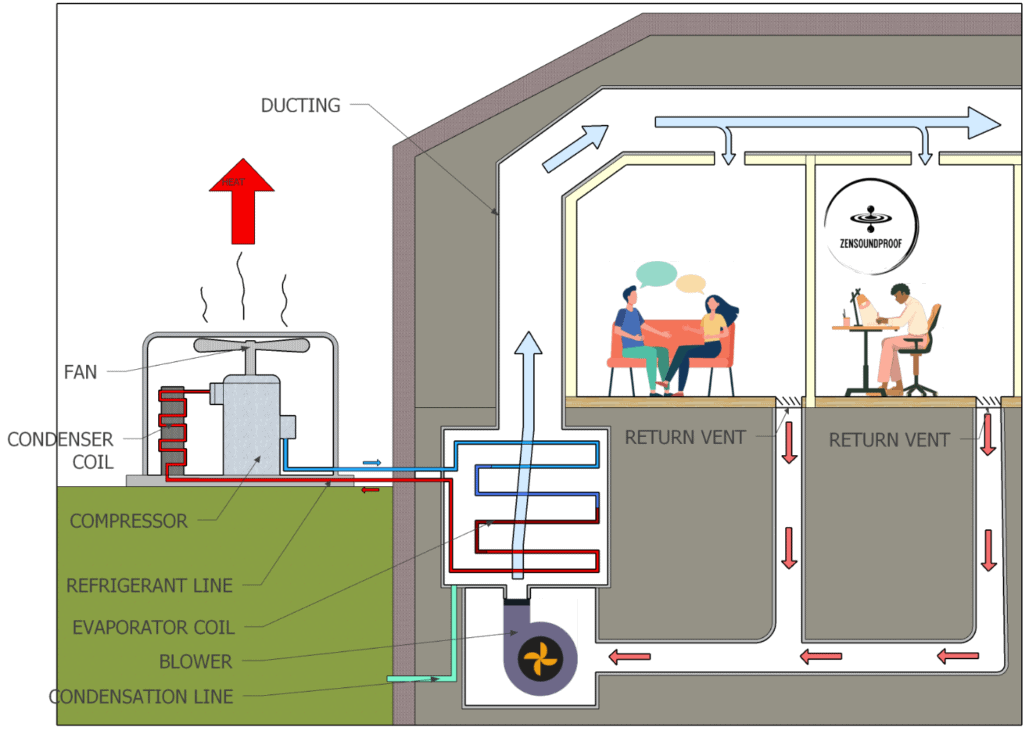
How to Reduce AC Noise
There are plenty of things you can do to lower the decibel rating of your air conditioner. Some are features on the unit, whereas others are about proper maintenance and placement.
Noise dampening features are first thing to consider. Your outdoor unit should have some insulation built in, which will help to muffle and dampen sounds created by the compressor. It won’t completely soundproof it but will help reduce how much sound you hear.
Another feature to look out for is energy efficiency. I’ll discuss this more later, but the bottom line is that an energy-efficient unit will either operate below peak capacity or have better control over its parts. Both result in quiet operation, simply because the unit isn’t working as hard.
Once you’ve installed your quiet AC, make sure you look after it properly. Have it inspected and cleaned annually at the very least. This ensures any worn parts (which could create noise) are replaced or repaired before they become a problem.
Our Top 5 Picks
In my top picks for the quietest central air conditioners, I obviously focus on noise levels. But I balance this against capacity and energy efficiency, as these feed into the overall noise level of an AC unit.
1. Top Pick: Ruud EcoNet UA20
- Variable Speed Compressor
- Cooling Cap.: 24 to 60 kBTU
- Energy Rating: 20.5 (SEER)
- Heating Eff.: No heater.
- Noise Level:
54 dB min
72 dB max - Warranty: 10 Yrs on compressor
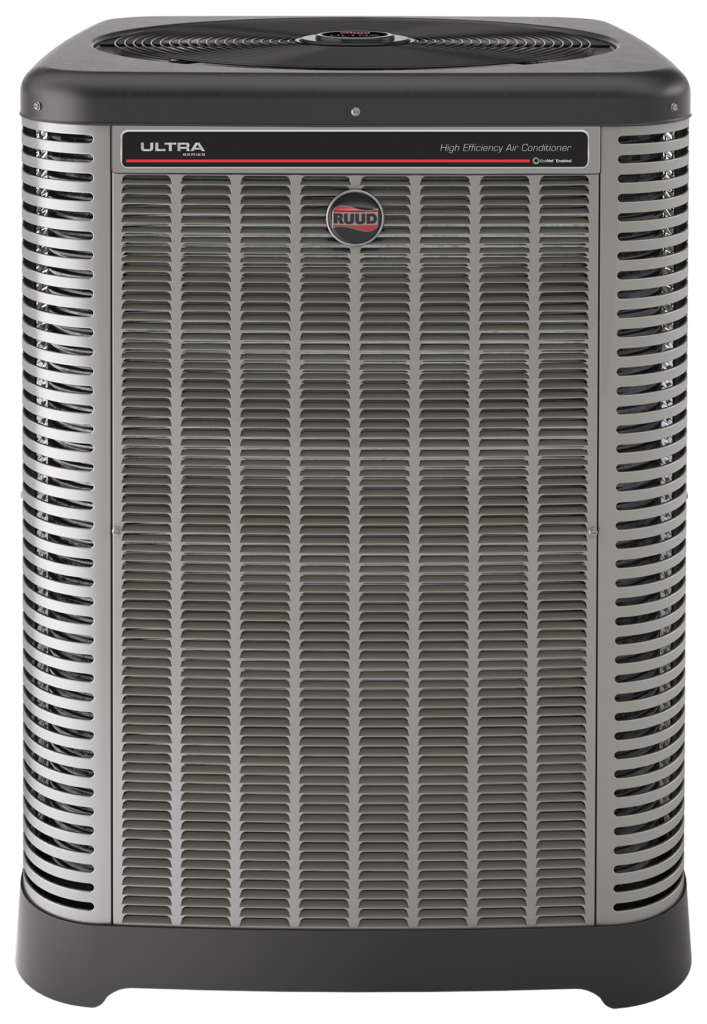
The Ruud EcoNet air conditioner is my top pick because it balances noise levels and energy efficiency. There are different sizes in the range, so the values given here vary quite a lot.
The range goes from 17.3 to 60.5 kBTU cooling, giving you plenty of flexibility depending on the size of your home.
The decibel rating is between 54dB and 76dB. The quietest AC in their lineup is the 4-ton model (A2048), with a noise level of between 54 and 72dB. The lineup has models between 2 and 5 tons.
They’re variable-speed ACs that operate between 25 and 100% capacity, but usually sit around 60%. There are numerous noise-reducing features, such as swept wing fan blades and ferrite rings in the power module. Ferrite rings concentrate the power’s magnetic field, reducing high-frequency noise. Swept fans similarly reduce noise by cutting down air turbulence.
The UA20’s SEER rating is 20.5 for all models. This is well above the Energy Star certification rating of 16, making this an efficient and quiet AC. While excellent, it’s quite far off the best in this class which range around an SEER of 26.
The main downside is the absence of heating (it’s not a heat pump). You’ll have to pair it with a gas furnace to compensate for that. If you’re looking for an all-rounder, check the Ruud UP20 instead. It’s a heat pump with the same cooling capacity and is a bit noisier (between 58 dB and 73 dB).
- Solid SEER rating of 20.5.
- Good tonnage for homes.
- Suitable balance of noise and efficiency.
- SEER is good but far from the best.
- No heating.
2. Heil Ion 19 HVA9
- Variable Speed Compressor
- Cooling Cap.: 24 to 60 kBTU
- Energy Rating: 19 (SEER)
- Heating Eff.: No heater.
- Noise Level:
56 dB min
75 dB max - Warranty: 10 Yrs on compressor
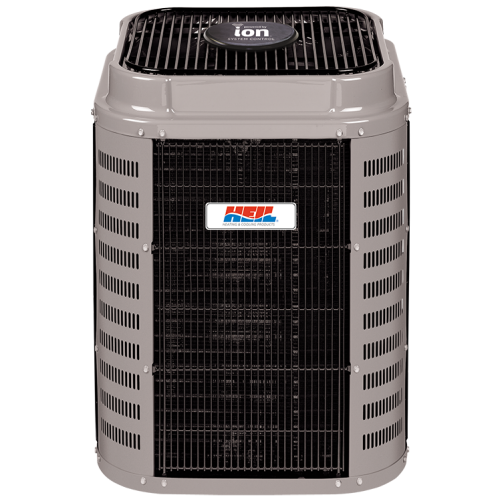
The Heil HVA9 air conditioner has smart functionality, meaning you can control it from your smartphone or the included wall panel. While not a necessary feature, it can be useful if you want your home to be cool when you return from work.
In terms of noise levels, it sits at 56dB in low mode. It reaches 75dB at high, making it slightly quieter than the Ruud above. Much like the Ruud, it’s a variable-speed AC, so it’ll rarely hit its upper sound levels.
It has weather and debris protection, which is always a benefit. You’ll be able to place it basically anywhere outside without worrying about it getting damaged. That said, a protective case never hurts!
The Heil has a SEER rating of up 19, putting it just below the Ruud. However, it’s still Energy Star certified, so you know you’re getting an efficient model. It comes in 2-5-ton (24K to 60K BTU) models, so you should find a suitable one for your home.
In terms of downsides, it’s another minor one. The Heil HVA9 doesn’t have a heating function, meaning you’ll need to rely on a gas furnace to deal with winter temperatures. If heating is a necessity, the Heil HVH8 is the equivalent heat pump of Heil’s lineup. It has a similar cooling capacity and noise emission level (56 dB min).
- Noise level of 56dB in low mode.
- Variable-speed compressor.
- Competitive pricing.
- SEER is the lowest in this list.
- Not a heat pump.
3. Lennox SL28XCV
- Variable Speed Compressor
- Cooling Cap.: 23.2 kBTU
- Energy Rating: 26 to 28 (SEER)
- Heating Eff.: No heater.
- Noise Level: 59 dB min
- Warranty: 10 Yrs on compressor
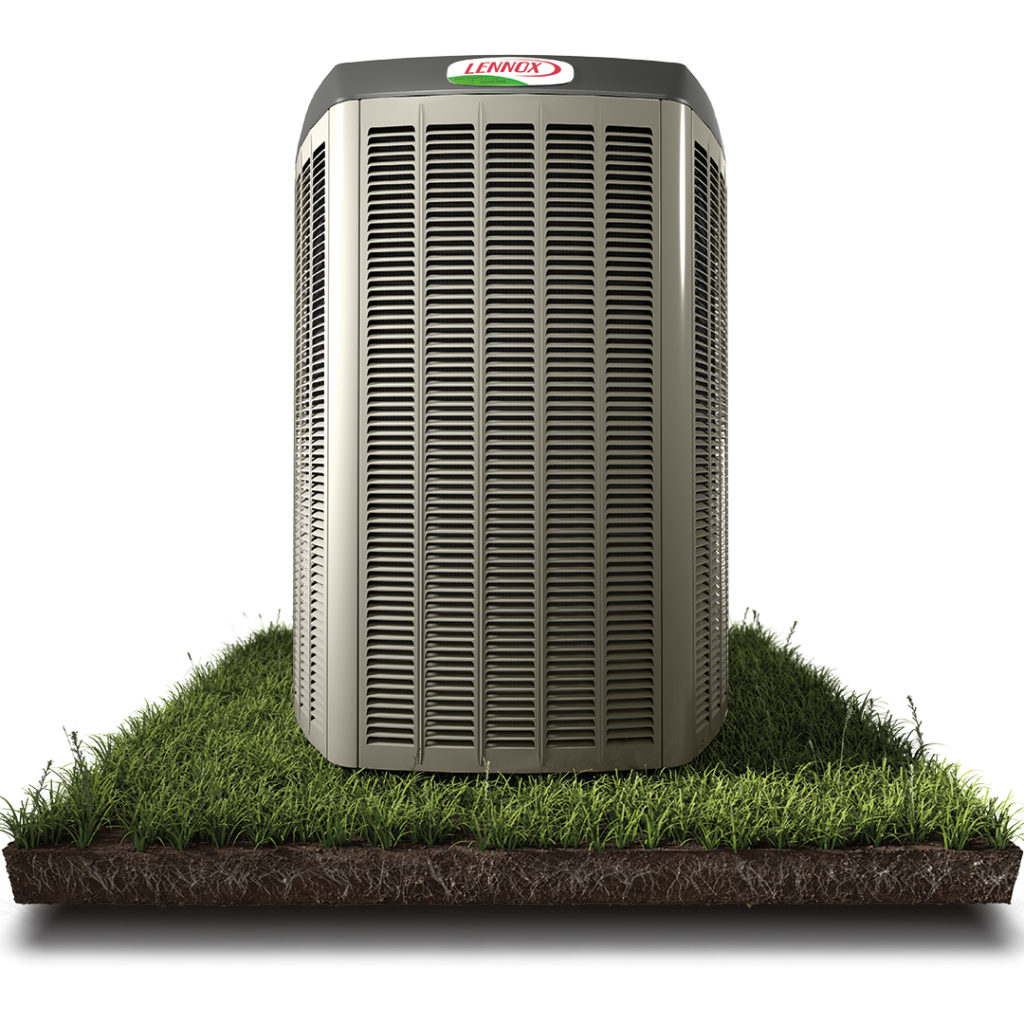
This Lennox SL28XCV is another variable-speed air conditioner. Its lowest decibel rating is 59dB, so it’s a bit louder than the others above. But, its SEER rating can be up to 28, which is amazingly efficient. It does mean you can potentially save more than 50% compared to the federal minimum energy efficiency requirement.
Like the Heil, it has smart connectivity, but you need the Lennox smart thermostat to take advantage of it. As such, the Heil is a better choice if you want smart features but don’t want specific infrastructure for it.
There’s a 10-year warranty on all parts, including the compressor. It’s fairly standard in the industry. You could always extend it if you wanted more coverage.
The outdoor unit has various durability features. One is its aluminum coil, which is unique to Lennox air conditioners. In short, it means the cooling coil won’t rust outdoors, helping to extend its lifespan.
Like the Heil, and the Ruud, the Lennox SL28XCV doesn’t have heat functionality. The company does make a comparatively efficient heat pump (the SL25XPV with a SEER rating of 24).
- Market-leading SEER rating of up to 28.
- Smart features.
- Rust-resistant cooling coil.
- No built-in heater.
4. Top Pick for Two-Stage AC: Coleman AC19 Echelon
- Two-Stage Compressor
- Cooling Cap.: 24 to 60 kBTU
- Energy Rating: 19.75 (SEER)
- Heating Eff.: No heater.
- Noise Level: 67 dB min
- Warranty: Lifetime on compressor
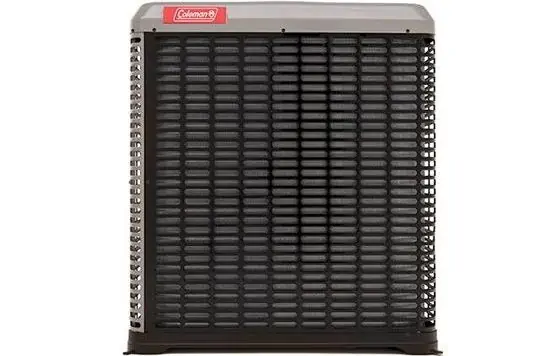
At a minimum decibel rating of 67dB, the Coleman AC19 is quite a bit louder than the variable-speed models above. But, as I explain below, this is a symptom of two-stage units.
You must offset this against the lower entry price, though. And, with a SEER rating of 19.75, it’s really not that far behind the Ruud. The model has a tonnage range of 2-5 tons (24K to 60K BTU), so it should be suitable for homes of all sizes.
What’s more, the Coleman AC19 is not a heat pump. It means it’s only good for cooling and can’t reverse its cycle for heating.
In terms of durability, the compressor unit is salt-spray rated and powder-coated, meaning it’s suitable for all outdoor conditions. Better yet, it comes with a lifetime limited warranty for the compressor, which is much better than the ACs above.
The compressor unit has various features to reduce noise levels. Like the Ruud, it has a swept wing fan to reduce air noise. It’s also got a composite base that dampens vibrations before they can become sound waves.
Despite the AC19 being a two-stage unit, you get the same kind of efficiency levels as a variable-speeds. Two-stage ACs are generally cheaper, too, so the AC19 gives you a good middle ground between price and efficiency.
Once again, the AC19 is an air conditioner only. The equivalent heat pump is the HC19. It emits 66 dB min, which means its noise level is very close to the AC19. Whatsmore, the HC19 is compatible with an additional gas furnace in case you need flexibility between gas and electricity.
- SEER rating of 19.75.
- Lifetime compressor warranty.
- Noise-reduction features.
- Decibel rating of 67dB is higher than variable speed compressors.
5. Top Pick for One-Stage Air Conditioner: Lennox ML14XC1
- One-Stage Compressor
- Cooling Cap.: 18 to 60 kBTU
- Energy Rating: 17 (SEER)
- Heating Eff.: No heater.
- Noise Level: 74 dB min
- Warranty: 10 Yrs on compressor (with product registration)
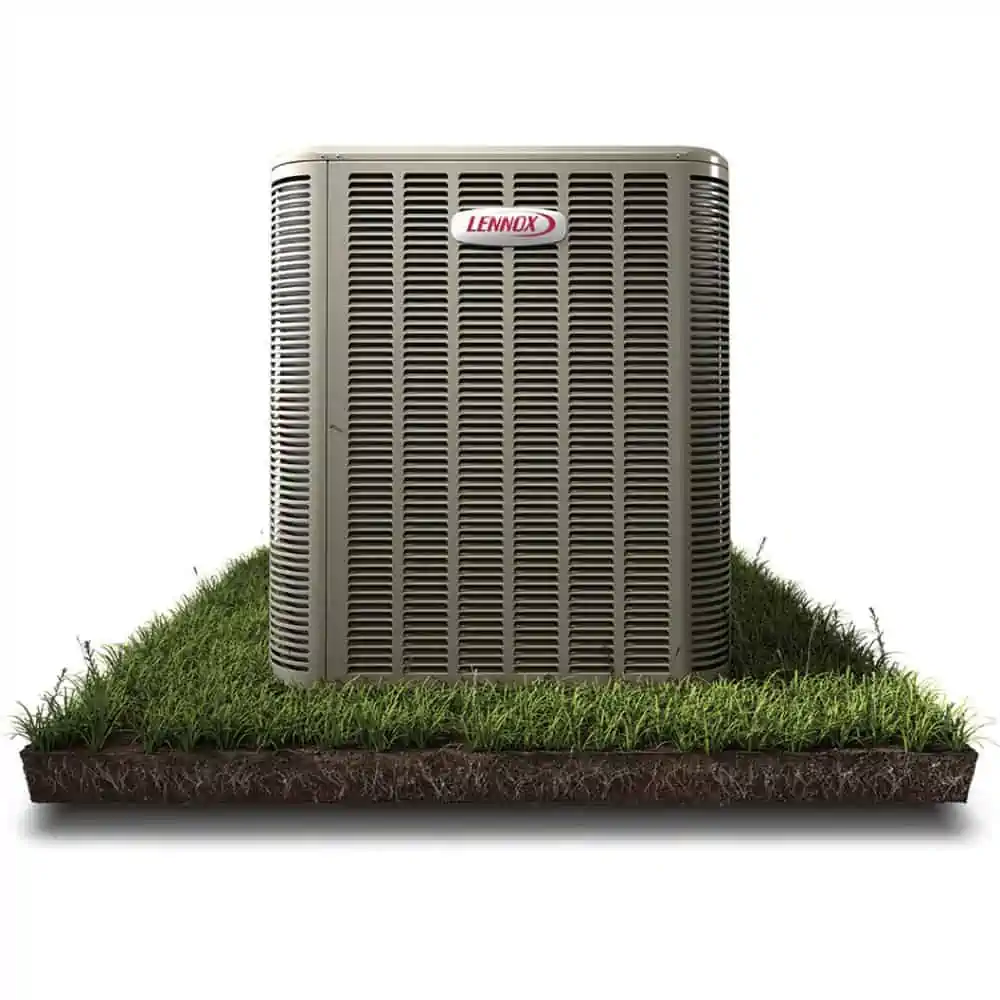
Lennox makes a pretty decent air conditioner, so it’s no surprise its ML14XC1 is my top pick for one-stage units. Its decibel rating is 74dB. While this is loud, it’s the same as the upper levels of the variable-speed models above. As I explain below, this is because of how a one-stage ACs works.
Despite being an entry-level product, the ML14XCI still has a SEER rating of 17. This might be the lowest on this list, but it’s really not far off the Coleman and Heil models. Energy Star certification is 16 or above, so it meets that criteria.
The ML14 range includes ACs from 1.5-5 tons, the equivalent of 18K to 60K BTU. Unsurprisingly, as an entry-level unit, it doesn’t have a heater.
Unsurprisingly, it’s not overloaded with features. The unit has a Permaguard coating (meaning hydrophobic, and UV resistant coating) for extra durability, and it comes with a 5-year limited warranty. Again, it’s the lowest on this list, but what can you expect from an entry-level product?
That’s the only real negative of the ML14XCI. Compared to the variable-speed models, it’s pretty lacking in terms of functionality. It turns on and off and doesn’t offer amazing temperature control as a result. But, if you need a (comparatively) inexpensive air conditioner, it’s a good pick.
- One-stage AC with a SEER rating of 17.
- Energy Star certified.
- Comparatively affordable option.
- Noise level of 74dB.
- Lacking functionality.
Features to Consider
So, other than noise levels, what else should we look at when choosing the quietest air conditioners? Here are the factors I consider most important when picking AC units.
Technology
All air conditioners run on the same basic technology – the outdoor unit has a compressor, a condenser, and a fan. The indoor unit includes the evaporator, a blower, and piping for air distribution throughout the building.
The principle is the same as for mini split air conditioners and fridges. A refrigerant is used to draw heat from indoors and transfer it to outside. It can do so by following what is called a Vapor Compression cycle.
But there are different options for how compressor technology works that affect noise levels (and efficiency).
One-Stage
A one-stage compressor is either on or off. When it’s on, it operates at 100% speed. This affects noise level, as it’ll only ever be on its loudest settings. Also, it’s the least efficient type because it only ever uses 100% of its power.
The main benefit of one-stage systems is the price. They’re the least expensive, so, providing the constant on-off and temperature fluctuations don’t bother you, they’re the easiest way in. However, you need to weigh this up against the increase in your energy bills.
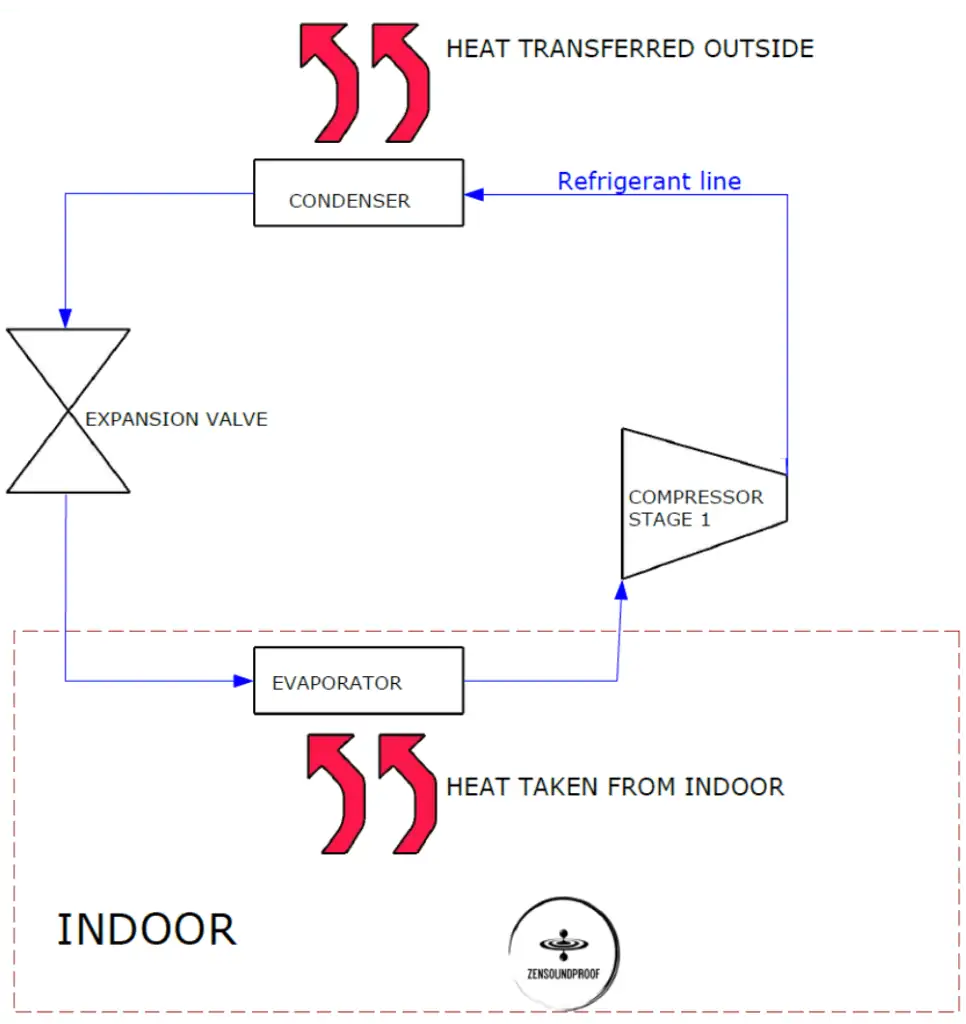
Two-Stage
Two-stage compressors have an extra speed, usually between 60 and 70% capacity. It varies by model, although it shouldn’t be difficult to find out. The AC will generally work less hard when it’s near the desired temperature and will only ramp up to 100% when it’s got work to do.
It’s a more energy-efficient option because you’ve got some variation in power level. Unsurprisingly, it affects noise levels, too, as the fans should adapt to this variation. They should follow the compression level of the refrigerant to dissipate more or less heat.
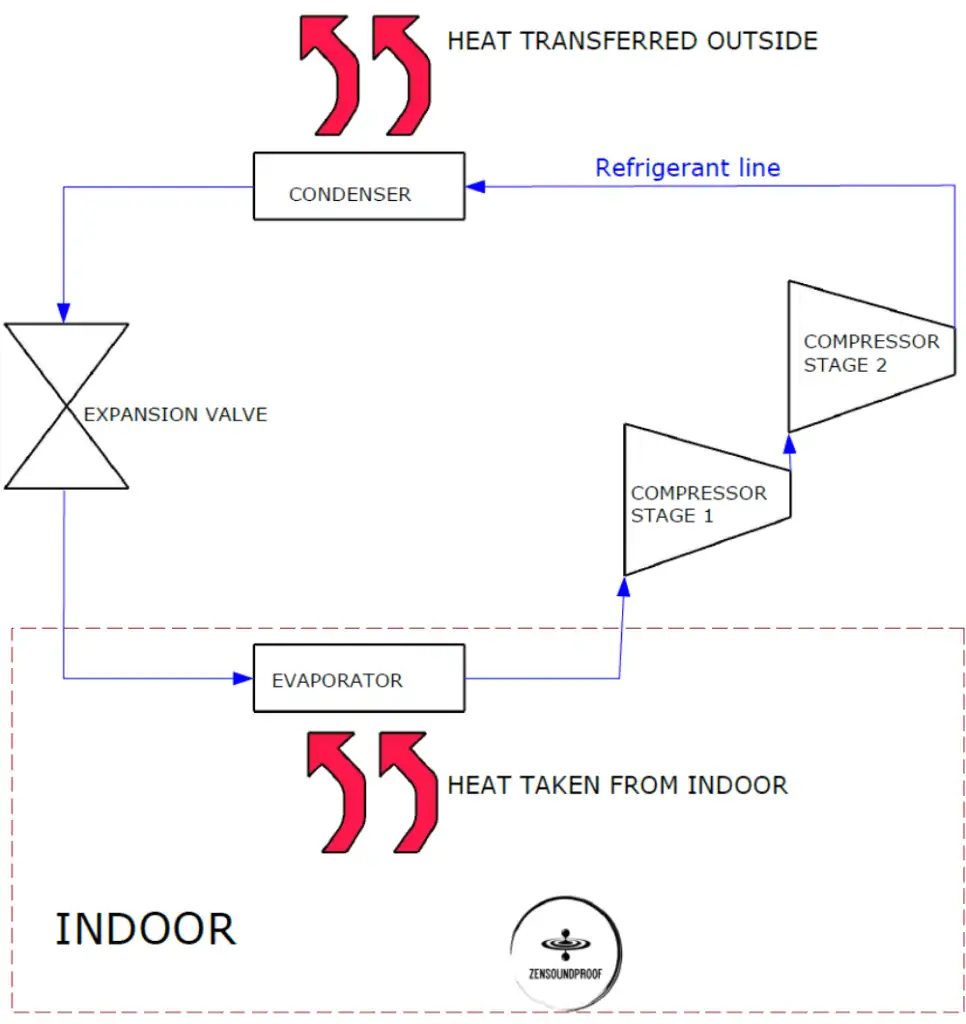
Variable Speed
You can probably guess what a variable-speed compressor is. Depending on the brand, it could have as many as 700 separate speed settings based on room temperature and airflow. You might also see it called proven multi-stage technology, but it’s the same thing.
The startup cost is much higher, though. They’re the most expensive and complex air conditioners, but also the most efficient. Most function around 40% of their max capacity and help keep the temperature more constant than other models.
Power
There are different ways of measuring an air conditioner’s power, but we’ll focus on BTUs first before looking at tons. BTU stands for British Thermal Unit, which is a measure of heating (or cooling) power.
A BTU is the amount of heat needed to raise the temperature of 1 pound of water by 1 degree Fahrenheit. We also use it for cooling power, where the opposite is true.
The bottom line is that higher BTU ratings are suitable for larger rooms. By extension, they consume more power when compared to AC units with a lower BTU rating.
You might instead see an air conditioner described as having tons of cooling. A ton, helpfully, is 12,000BTUs. So, a 3-ton air conditioner has 36,000BTUs of cooling power.
For a central air conditioner, you need to know your home’s square footage to work out the required tonnage. Unlike a portable AC, which cools a single room, a central AC cools your whole home.
You can use this calculator to work out the necessary tonnage for your home’s central AC.
I recommend choosing a model that’s more powerful than you need. Variable-speed ACs work below their maximum output, so choosing bigger air conditioners theoretically means they’ll run at a lower setting. In turn, this means a quieter unit.
Efficiency
Energy efficiency is vital for keeping bills down. We measure AC efficiency using the SEER rating. It stands for Seasonal Energy Efficiency Ratio, measured by dividing the cooling output by energy consumption in watt-hours.
Don’t worry, you’re not expected to calculate this yourself. Any air conditioner that states it’s efficient will carry a SEER rating. Anything over 13 is acceptable, but 16 or higher is a really efficient air conditioner. To be Energy Star certified, an AC must have a SEER rating of 15 or higher.
Generally, two-stage and variable-speed ACs have the highest SEER ratings. A one-stage creates uneven cooling and isn’t great at reducing humidity, which keeps its SEER rating down.
But, as you can see from the one-stage AC above, it doesn’t always have to mean poor efficiency. The right model can almost compete with expensive variable-speed ACs.
Warranty
The typical lifespan for an AC unit is 15-20 years. After this point, it’s outpaced by advances in technology, so it’s usually not viable to repair it. Of course, you could keep it going after this time.
So, a good warranty for an air conditioner is at least 10 years. Some manufacturers will offer up to 20 years, however.
You’ll probably find different parts have different warranties. For example, the fans might have 20 years, whereas the compressor only has 10. This is because it’s more likely to break first. This is why, I mainly listed the warranty duration of compressors in the list above. Either way, make sure you have annual inspections!
Compressor Installation
This is less about features when buying an AC and more about tips when installing. You’ll generally need a professional to install your new unit, so make sure you ask them about noise-reducing mounts.
These can include housed spring mounts, which dampen sound waves emitted by the compressor. Alternatively, you could house the compressor in a sound trap or install it away from your windows.
Price
Usually, we’d discuss a product’s price, either compared to the larger market or other products on the list. This isn’t really possible with central air conditioners because of the way they’re sold.
You’ll need to go to a registered dealer for your new air conditioner, and they’ll probably install it for you too. As such, prices can vary wildly across the country.
The bottom line is that one-stage ACs are usually the cheapest and variable-speed are the most expensive. Also, the more features it has, the higher the price will be.
Alternatives to Central Air Conditioners
An HVAC unit isn’t your only option for cooling your home. Here are some alternatives depending on your circumstances.
Mini Split AC
A mini split needs less infrastructure and is ideal for one or two rooms. They can cool up to 5 rooms from the same compressor, and are second in efficiency only to central HVAC.
The benefits are that they’re smaller, cheaper and quieter. Mini splits are the right combination of technology and convenience if you’ve only got a few rooms to cool.
Window AC
A window AC unit is a compressor and blower all in one. It sits in a window frame, draws in air, and then blows it into the room. They’re much less expensive but are obviously suitable for just one room.
A similar alternative is a portable AC, which is much the same, except you can move it between rooms. Window ACs and portable air conditioners are the least efficient but are also the least expensive. They’re suitable options for students, renters, or people without central HVAC infrastructure.
Final Thoughts
I hope you’ve now got enough information to buy an efficient (and quiet) central air conditioner.
My overall top pick is the Ruud EcoNet UA20 series. They’re the right balance of quiet and efficient – and cost. That said, my top picks for one- or two-stage air conditioners are pretty good, too.
Is there one brand you favor above all others when it comes to picking the quietest central air conditioner? Let me know below, as I’d love to mention it to my readers.
